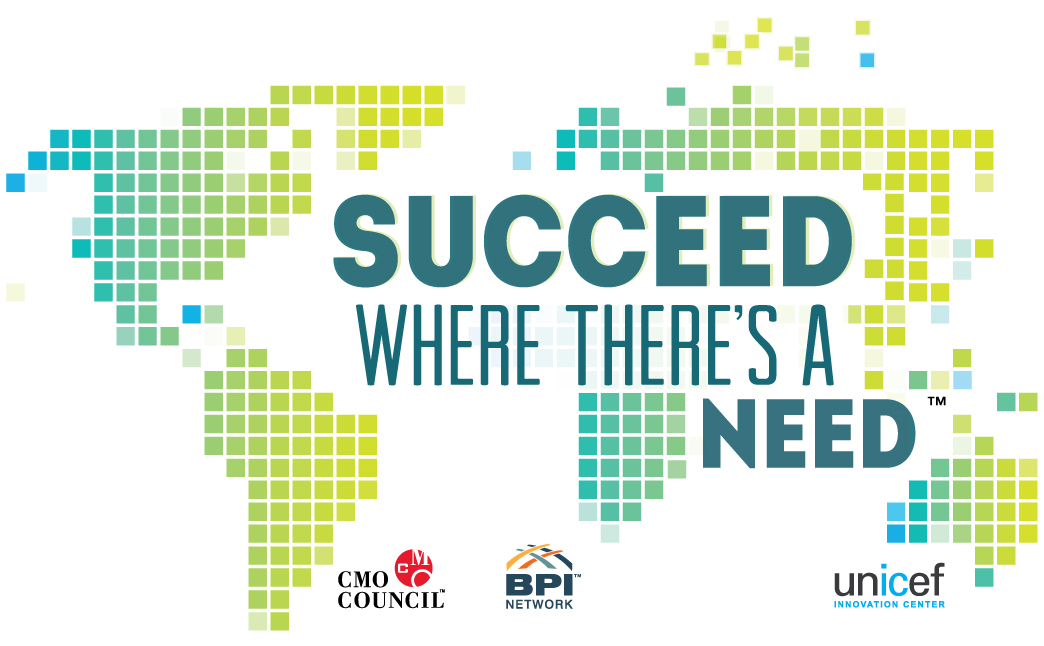CMO Council Launches Global Innovation Ecosystem To Help UNICEF
CauseTech.Net Community to Crowdsource Ideas and Inspirations That Advance UNICEF's Use of Social Impact Technology to Further its Mandate Worldwide
The Chief Marketing Officer (CMO) Council today announced the launch of a global CauseTech.net community and portal site, which is part of a new private sector initiative to crowdsource breakthrough ideas, inventions, products, and emerging technologies that can advance the work done by the UNICEF Global Innovation Center worldwide.
Dubbed "Succeed Where There's a Need," the campaign promotes social entrepreneurship and aims to aggregate the world's best and brightest innovators, technologists, IT professionals, product developers, researchers, entrepreneurs, academics and post-graduate students in a global open innovation ecosystem.
The aim is to tap into collective thinking and input to identify, adapt and deploy inventive technology solutions that can help UNICEF scale its efforts to meet the ever-growing needs of the poorest and most vulnerable and excluded children across 150 countries.
A dedicated community site (CauseTech.Net), powered by innovation platform leader IdeaScale, will enable participants to share ideas, vote and discuss refinements to "inspirations that overcome limitations." CauseTech.Net will register and profile contributors and run crowdsourcing contests and challenges developed by UNICEF offices located in more than 150 countries.
Using the tagline, "Your Brilliance Can Make a Difference," the campaign will also involve the Business Performance Innovation (BPI) Network and the Global Renewable Energy & Environmental Network (GREEN) as partners. Collectively these groups represent more than 12,000 high-level executives (CMOs, CIOs, CTOs, COOs, CFOs, LOB leaders, etc.) in 110 countries. Other partners and affiliates include media and publishing groups, corporate R&D centers, universities, incubators, accelerators, venture capitalists, angel investors, and serial entrepreneurs.
"We hope private sector partners will step forward here to provide funding for crowdsourced innovation challenges and to help us engage smart minds in solving real-world problems UNICEF workers are facing in the field," notes Donovan Neale-May, executive director of the CMO Council and BPI Network. A new global survey on Disruptive Entrepreneurship by his BPI Network, highlighted the top ways corporations could help advance social innovation. This includes:
- Investing startups and crowdsourced ideation contests and challenges
- Allocating resources to social innovation programs within the company
- Supporting social causes focused on advancing technology innovation
"UNICEF is committed to ensuring innovative solutions be scaled to address needs for all," notes Dr. Sharad Sapra, director of the UNICEF Global Innovation Center which has R&D labs in 10 countries. "Despite incredible developments and technological advances across the globe, there are still many populations that are remote and deprived.
"Our development strategy is to be the connector between all the relevant actors in the value chain, to ensure innovative solutions can be successfully implemented and scaled across regions and contexts," adds Dr. Sapra who will keynote a Global Social Enterprise track at the upcoming TiEcon event on May 16 in Silicon Valley, which is the world's largest gathering on entrepreneurship. "Achieving our goal of reaching every child requires disrupting 'business as usual.' New ways of thinking have to be developed. Assumptions and strategies must change. That's why innovation is so important," he adds.
While the platform will enable ongoing open ideation around challenges such as Last Mile Access, it will also run timed contests curated by UNICEF Innovation teams. The first official contest will launch June 1, 2015 through UNICEF's Burundi Innovation Lab. This challenge will focus on alternative energy solutions for Burundi, a country where only three percent of the population is connected to the electricity grid. The aim is to accelerate product development and market expansion while building local entrepreneurship and testing a new hybrid public-private partnership. Idea submission will remain open from May 1st through July 15th 2015. The award ceremony will take place on August 25th 2015 and the winner's idea will then be tested in the field through UNICEF's Innovation Lab in Burundi.
The CauseTech website features novel technologies and solutions that serve as inspirations for the community moving through the ideation process. These technologies are also profiled for crowdsourced discussion through the ideation platform. Some highlights include:
- The Twerly self-powered streetlight, which uses hybrid wind and solar energy sources, and provides the capability to bring WiFi connectivity and video surveillance to off-grid communities.
- DryBath, the world's first germ-killing bath substitution gel/lotion. DryBath is non-toxic, hypo- allergenic, and safe for the entire body. Simply by being applied to the skin, it kills 99.9 percent of germs, moisturizes, and provides a clean scent. Hand washing with soap is one of the cheapest, most effective ‘vaccines' against viral diseases, from the seasonal flu, to the common cold.
- Off-grid technology learning solutions from Lifeline Energy provide solar-powered, wind-up media players and radios that deliver educational programming in rural villages. More than 500,000 are in use across sub-Saharan Africa.
- The EcoloBlue Atmospheric Water Generator (AWG) that literally produces pure drinking water from air using efficient mechanical processes that can be powered by renewable energy sources.
UNICEF has already experienced the positive benefits of private-public partnerships. One such example is the relationship forged between UNICEF and the Nyaruka team of Rwanda. Nyaruka developed an SMS text messaging platform that UNICEF has leveraged and scaled to be an Open Source communication solution called RapidPro. RapidPro enables the developer and development community to quickly build and deploy mobile messaging solutions in the field. Some of the ways RapidPro is creating an impact include:
- U-report Nigeria: Engaging youth in dialogue on issues that matters most to them.
- eduTrac Afghanistan: Remotely connecting teachers in Kandahar to monitor progress in the classroom.
- mHERO Liberia: Connecting with Frontline Health Workers in response to the Ebola oubreak.
- Polio Pakistan: Powering frontline staff communication and motivation to help eradicate Polio.
